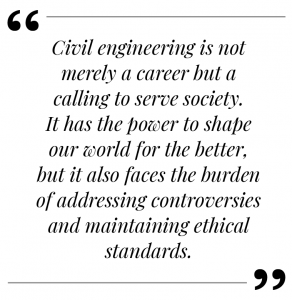 CIVIL engineering, often regarded as the silent force behind our modern world, plays a pivotal role in shaping our societies, economies, and environments. It is not merely a profession but a form of public service that impacts every facet of our lives. As we delve into the significance of civil engineering, we must also address the pressing issues within the field that affect its credibility and, consequently, the welfare of society.
CIVIL engineering, often regarded as the silent force behind our modern world, plays a pivotal role in shaping our societies, economies, and environments. It is not merely a profession but a form of public service that impacts every facet of our lives. As we delve into the significance of civil engineering, we must also address the pressing issues within the field that affect its credibility and, consequently, the welfare of society.
Civil engineering encompasses a vast spectrum of activities, from designing and constructing infrastructures to managing and maintaining them. The discipline is responsible for the roads we drive on, the buildings we live and work in, and the bridges connecting communities. Every aspect of modern life is intricately intertwined with civil engineering.
When we turn on a tap to access clean water, cross a well-maintained bridge, or enjoy the comfort of an earthquake-resistant building, we owe our gratitude to civil engineers. They are the unsung heroes who work diligently behind the scenes, ensuring our safety and convenience.
They are not mere builders; they are nation builders. They are the architects of progress, contributing to economic growth and societal development. The construction of roads, railways, drainage, communication, power, and transportation networks, such as roads and railways, facilitates trade and commerce, stimulating economic activity. Robust and sustainable infrastructures attract investments, create job opportunities, and improve citizens’ overall quality of life.
In essence, civil engineers are also considered the economy’s movers, propelling nations forward through their innovative designs and efficient project execution. Their work directly impacts a country’s competitiveness on the global stage.
However, the noble profession of civil engineering is not without its shadows. Controversies surrounding corruption, mismanagement, and substandard projects have marred the reputation of this essential field, particularly in countries like ours, where issues in public works and highways have come to the forefront.
The recent flyover controversy in Iloilo serves as a glaring example. The sinking foundations of the P680-million flyover project not only reflect engineering challenges but also raise questions about proper soil testing, inspection, and monitoring in terms of specs, protocols, and processes. After all the million-peso-worth of evaluation and “interventions,” it is probably open to public use for the good, pilot test, or show. Nonetheless, such instances erode public trust in civil engineering projects and underline the need for stringent quality control and accountability.
One major hurdle in addressing these issues is the fear among engineers, especially those in lower ranks, to speak up. Many higher-ranking engineers in DPWH are perceived to be part of a syndicate in collaboration with contractors and politicians, perpetuating corruption. This culture of “SOP” (Standard Operating Procedure) corruption threatens the profession’s integrity.
Engineers must find their collective voice to combat these challenges. By standing up for ethical standards, transparency, and accountability, they can help cleanse the field of these malignancies. It is a shared responsibility to ensure their projects genuinely serve the public interest. Those in the higher-ups must also dip their fingers and genuinely show their alleged political will to fix this technical and administrative quicksand.
We pray that all civil engineers—the supposed civil serving superheroes in disguise—would be able to embrace the principles of integrity and service as they fulfill their duties. These values remind us that public service extends beyond job descriptions and profit margins; it is about making ethical decisions for the greater good.
This September 29-30 at Sugarland Hotel in Bacolod City, as the 13th Regional Technical Conference 2023 takes place, focusing on “Innovations in Interdisciplinary Approaches to Civil Engineering Challenges,” it is an opportune time to reflect on the importance of civil engineering and the responsibilities it carries. This gathering of civil engineers and allied practitioners underlines the commitment to innovation and excellence within the profession.
Civil engineering is not merely a career but a calling to serve society. It has the power to shape our world for the better, but it also faces the burden of addressing controversies and maintaining ethical standards. The challenges within the field should not overshadow its immense contributions.
As we navigate the complexities of civil engineering, let us remember that our collective responsibility is to ensure that the structures we build, both physical and ethical, stand the test of time. By upholding integrity, transparency, and a dedication to the public good, civil engineers can continue to be the unsung heroes who fortify the foundations of our society.
***
Doc H fondly describes himself as a ‘student of and for life’ who, like many others, aspires to a life-giving and why-driven world that is grounded in social justice and the pursuit of happiness. His views herewith do not necessarily reflect those of the institutions he is employed or connected with.
